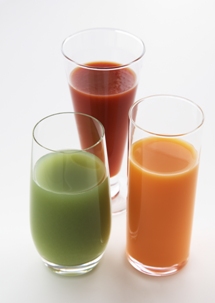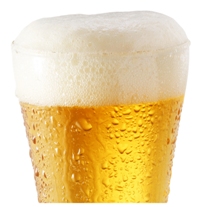
The human body is anywhere from 55% to 78% water depending on body size. Although often overlooked as a nutrient, water (H2O) is actually the most critical nutrient of all.
Humans can survive weeks without food but only a matter of days without water. To function properly, the body requires between one and seven liters of water per day to avoid dehydration; the precise amount depends on the level of activity, temperature, humidity, and other factors. Most of this is ingested through foods or beverages other than drinking straight water. It is not clear how much water intake is needed by healthy people, though most advocates agree that 6–7 glasses of water (approximately 2 liters) daily is the minimum to maintain proper hydration. Medical literature favors a lower consumption, typically 1 liter of water for an average male, excluding extra requirements due to fluid loss from exercise or warm weather. For those who have healthy kidneys, it is rather difficult to drink too much water, but (especially in warm humid weather and while exercising) it is dangerous to drink too little. People can drink far more water than necessary while exercising, however, putting them at risk of water intoxication (hyperhydration), which can be fatal. The popular claim that "a person should consume eight glasses of water per day" seems to have no real basis in science. Similar misconceptions concerning the effect of water on weight loss and constipation have also been dispelled.

Water is consumed not only as water itself and as a constituent of other beverages but also as a major component of many foods, particularly fruits and vegetables, which may contain from 85 to 95 percent water. Water also is manufactured in the body as an end product of metabolism. About 2.5 litres (about 2.6 quarts) of water are turned over daily, with water excretion (primarily in urine, water vapour from lungs, sweat loss from skin, and feces) balancing intake from all sources. Because water requirements vary with climate, level of activity, dietary composition, and other factors, there is no one recommendation for daily water intake. However, adults typically need at least two litres (eight cups) of water a day, from all sources. Thirst is not reliable as a register for dehydration, which typically occurs before the body is prompted to replace fluid. Therefore, water intake is advised throughout the day, especially with increased sweat loss in hot climates or during vigorous physical activity, during illness, or in a dehydrating situation such as an airplane flight.
A major nutrition fact is the body ph balance
As explained in the properties of water page, on the Ph scale from 1 to 10, the neutral zone is between 7-8. The human body acid/alkaline balance has to be between 7.35 - 7.45 to insure a good health. Eaither too acid (1-7), or to alkaline (7-10) our body becomes sick.
- When your body is acidic, it cannot assimilate vitamins and minerals, it's susceptible to sickness, it's difficult to lose weight, etc.
- By increasing your body pH to be more alkaline, you increase the oxygen to your body, increase your energy, and enhance your immune system to better heal itself.
- Balancing a proper body pH is essential and controls the speed of the body's biochemical reactions, as well as cellular and metabolic - activities and functions.
- Maintaining proper body alkalinity is essential for life, health, and vitality! To regain a life-supporting alkaline state, acids need to be buffered or neutralized through a combination of salts and minerals.
- Alkalinity is a very important nutrition fact for our immune system, enzymatic system, repair mechanisms, biochemical functioning, bone health, etc.
Water nutrition fact: acid-alkaline food
The main cause of metabolic acidosis are poor dietary habits,which simply means eating food that is not natural, therefore not compatible with our natural organism... like:
processed food,
chemical ingredients and flavors,
chemically treated soil and plants and also
all farmed animals products...
Effect Of Water On Weight Gain And Weight Loss
Because the human body contains so much water, rising or falling levels may cause an equal increase or decrease in our weight. For example, water retention (sometimes called edema or oedema) with accompanying weight gain, is a common symptom of PMS and Menopause. While a very low carbohydrate diet (eg. Atkins Diet) typically leads to a loss of water (because carbs bind with water) leading to a rapid initial loss of weight. Weight loss is also a common symptom of dehydration.
Fluid Intake From Water And Food
We don't store water in the way we store energy in the form of body fat, so we need a new supply each day. Every day on average our body loses the equivalent of 6-12 cups of water, which must be replaced. The digestion and metabolism of food typically gives us about 15 percent of our water needs. Our body converts part of our food into hydrogen and combines this with oxygen in the air we breathe to form water. The remaining 85 percent comes from water in our diet. As a very rough guide, we need to eat/drink the equivalent of 8 x 10-ounce glasses of water. But we don't necessarily need to take in this fluid in the form of drinking water. Eating water-containing food is fine, too. Here are some common and not-so-common examples:
loses the equivalent of 6-12 cups of water, which must be replaced. The digestion and metabolism of food typically gives us about 15 percent of our water needs. Our body converts part of our food into hydrogen and combines this with oxygen in the air we breathe to form water. The remaining 85 percent comes from water in our diet. As a very rough guide, we need to eat/drink the equivalent of 8 x 10-ounce glasses of water. But we don't necessarily need to take in this fluid in the form of drinking water. Eating water-containing food is fine, too. Here are some common and not-so-common examples:
- Most fruits are largely composed of water.
- Liquids like milk and fruit juices contain plenty of water.
- Vegetables are rich in water.
- A hamburger is 50 percent water.
- Swiss cheese is 38 percent water.
- Regular hard bagels are almost 30 percent water.
The latest dietary reference intake report by the United States National Research Council in general recommended (including food sources): 2.7 liters of water total for women and 3.7 liters for men. Specifically, pregnant and breastfeeding women need additional fluids to stay hydrated. According to the Institute of Medicine—who recommend that, on average, women consume 2.2 liters and men 3.0 liters—this is recommended to be 2.4 liters (10 cups) for pregnant women and 3 liters (12 cups) for breastfeeding women since an especially large amount of fluid is lost during nursing. Also noted is that normally, about 20% of water intake comes from food, while the rest comes from drinking water and beverages (caffeinated included). Water is excreted from the body in multiple forms; through urine and faeces, through sweating, and by exhalation of water vapor in the breath. With physical exertion and heat exposure, water loss will increase and daily fluid needs may increase as well.
Beverages  Although most adults drink one to two litres (about one to two quarts) of water a day, much of this is in the form of liquids such as coffee, tea, fruit juices, and soft drinks. In general, these are appreciated more for their taste or for their effects than for their nutritive value. Fruit juices are, of course, useful for their vitamin C content and are good sources of potassium. Coffee and tea by themselves are of no nutritive value, except that coffee contains some niacin and tea contains fluoride and manganese; these beverages also contain natural caffeine, which has a stimulating effect. Caffeine is added to colas, and so-called diet soft drinks contain small quantities of artificial sweeteners in place of sugars so that their overall calorie value is reduced.
Although most adults drink one to two litres (about one to two quarts) of water a day, much of this is in the form of liquids such as coffee, tea, fruit juices, and soft drinks. In general, these are appreciated more for their taste or for their effects than for their nutritive value. Fruit juices are, of course, useful for their vitamin C content and are good sources of potassium. Coffee and tea by themselves are of no nutritive value, except that coffee contains some niacin and tea contains fluoride and manganese; these beverages also contain natural caffeine, which has a stimulating effect. Caffeine is added to colas, and so-called diet soft drinks contain small quantities of artificial sweeteners in place of sugars so that their overall calorie value is reduced.
Since ethyl alcohol (ethanol) has an energy value of 7 kilocalories per gram, very significant amounts of energy can be obtained from alcoholic drinks (see table). Beer contains 2 to 6 percent alcohol, wines 10 to 13 percent, and most spirits up to 40 percent. Fermented drinks also include significant amounts of residual sugars, and champagne and dessert wines may have sugar added to them. With one or two exceptions, alcoholic beverages contain no nutrients and are only a source of “empty calories.” The only vitamin present in significant amounts in beer is riboflavin. Wines are devoid of vitamins but sometimes contain large amounts of iron, probably acquired from iron vessels used in their preparation. Heavy alcohol consumption is known to lead to a greater risk of malnutrition, in part because it can damage the absorptive power of the gut and also because heavy drinkers commonly neglect to follow a normal pattern of meals. On the other hand, evidence from a number of studies shows that persons consuming one to two drinks per day are healthier than are those who abstain from drinking alcohol. This might be due in part to substances in red wine, such as flavonoids and tannins, which may protect against heart disease.
amounts of iron, probably acquired from iron vessels used in their preparation. Heavy alcohol consumption is known to lead to a greater risk of malnutrition, in part because it can damage the absorptive power of the gut and also because heavy drinkers commonly neglect to follow a normal pattern of meals. On the other hand, evidence from a number of studies shows that persons consuming one to two drinks per day are healthier than are those who abstain from drinking alcohol. This might be due in part to substances in red wine, such as flavonoids and tannins, which may protect against heart disease.
![]()
Disclaimer: This website is for information purposes only. By providing the information contained herein we are not diagnosing, treating, curing, mitigating, or preventing any type of disease or medical condition. Before beginning any type of natural, integrative or conventional treatment regime, it is advisible to seek the advice of a licensed healthcare professional.



























